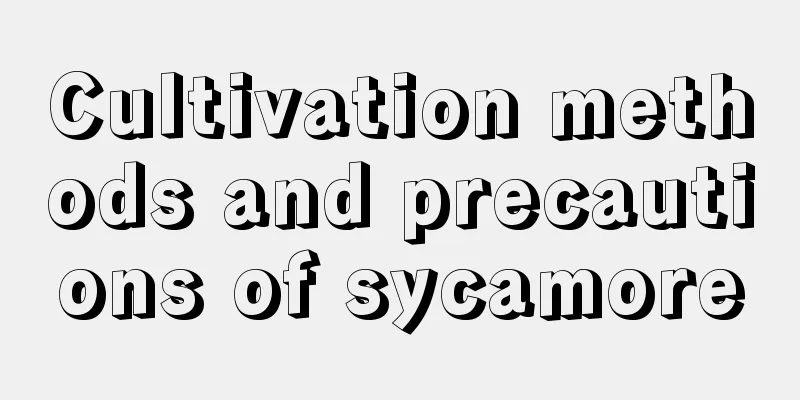Cultivation methods and precautions of sycamore

1. Maintenance methods1. Substrate selection: It is best to choose relatively loose and breathable soil, and the soil layer should be thicker to facilitate the rooting of the sycamore. It can grow in both acidic and neutral soils, but its survival rate is low in alkaline soils, and puddles are also not conducive to the growth of sycamore. 2. Temperature management: Sycamore is suitable for growing in a warm and humid environment. It is afraid of cold and needs insulation treatment when the temperature is below minus 3℃ in winter. Similarly, if the temperature is too high in summer, it will also affect growth. The optimal temperature is roughly 15℃-25℃. 3. Water management: Water the sycamore seedlings frequently in the early stages, and try to keep the soil slightly moist. During the rapid growth stage, increase the amount of water and reduce the number of waterings, and stop watering in the later stage. 4. Nutrient management: Deeply plow the soil around the tree roots every autumn, and add base fertilizers such as oil residue and feces. In addition, during the fruiting period, a mixture of superphosphate, ammonium nitrate and bean cake can be applied. 2. Breeding techniques1. Sowing: Sowing is a common method of propagation. When the sycamore fruits ripen in autumn, pick the bulbs, dry them and take out the seeds. They can be sown in the autumn of the same year, or stored for sowing in the spring of the following year. The recommended row spacing when sowing is 250mm, and then cover with a layer of soil about 15mm thick. 2. Wintering: The weather is very dry in winter, so you need to prune the branches before wintering to prevent water loss. The temperature in the north is low in winter, so you can wrap the tree trunks with a layer of straw mats before winter to keep them warm. 3. Problem diagnosis and treatment1. Frost moth: It feeds on the leaves of sycamore trees, and in severe cases it will eat the entire leaf. Turning the soil several times in winter can kill some insect pupae. After the disease appears, you can spray the back of the leaves with DDT or Lecithin mixed with water. 2. Leaf falling: The plant may be infested with sycamore bugs. You can spray the plant with omethoate once every week. Make sure to use enough medicine and spray evenly. IV. Other issues1. Can it be grown at home? The branches and leaves of the paulownia tree are lush and green, so it can be grown at home. And the management requirements are not strict, so it is very suitable for planting in the courtyard. 2. Can it be planted in the ground: Yes. After growing up, the sycamore is mainly used as an urban greening tree. It requires loose soil, is more water-efficient, and has a higher survival rate when planted in the ground. |
<<: Cultivation methods and precautions of water tower flower
>>: Cultivation methods and precautions of evening primrose
Recommend
Pothos and Clivia... grow too slowly? Learn 2 tricks, climb up the wall, the leaves are green and shiny!
Why does the green radish grow slowly? Every time...
When is the best time to transplant yew?
Before transplanting the yew, it is necessary to ...
The most worthwhile bougainvillea variety
1. Lipstick The edges of the petals of lipstick b...
How to breed velvet needles
Cuttings Velvet needles are very easy to grow in ...
The correct method of hydroponic garlic
1. Choosing Garlic Before hydroponics, you need t...
Purple Bean Planting Time and Method
Purple bean planting time When planting purple be...
Can bamboo palm be sown?
Conditions required for seed propagation of bambo...
Can prune pits be planted? How to plant prune pits in pots?
After planting prune pits, ensure sufficient wate...
Corn growing environment and growing conditions
Corn growing environment and conditions Corn pref...
Can Christmas cactus be hydroponically cultivated? Hydroponics methods and precautions
Can Christmas cactus be hydroponically cultivated...
How to grow delphinium
1. Watering It has a certain degree of drought re...
Causes and treatments for yellow leaves of oleander
1. Too much watering 1. Reason: Watering it too m...
What is the yellow thing inside mangosteen?
1. Damage Mangosteen itself will secrete a yellow...
What to do if the rose buds do not bloom
Reasons why rose buds do not bloom Maintenance re...
How to water purple bamboo plum
1. How to water 1. Watering frequency: When water...









